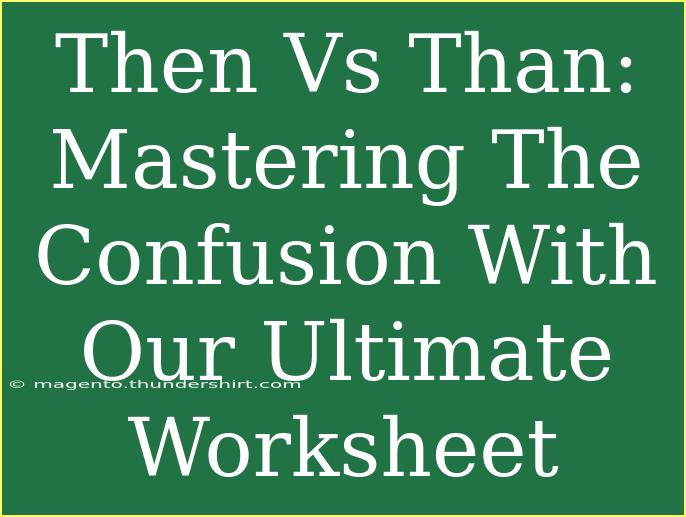It’s a common mistake that even seasoned writers make: confusing "then" and "than." These two little words may sound similar, but they serve very different purposes in the English language. If you're someone who wants to master these differences and sharpen your writing skills, you’ve come to the right place! 🎯
Understanding "Then" and "Than"
"Then" is primarily used to refer to time or a sequence of events. It's your go-to word when you're explaining when something happened or will happen.
For example:
- “I will finish my homework, and then I will go outside to play.”
"Than," on the other hand, is used for making comparisons. It’s what you reach for when you're weighing one thing against another.
For instance:
- “She is taller than her brother.”
Practical Uses of "Then" and "Than"
To help you visualize and remember these words, here’s a simple table that shows their uses:
<table>
<tr>
<th>Word</th>
<th>Usage</th>
<th>Example</th>
</tr>
<tr>
<td><strong>Then</strong></td>
<td>Indicates time or a sequence</td>
<td>We had lunch, then we went shopping.</td>
</tr>
<tr>
<td><strong>Than</strong></td>
<td>Used for comparisons</td>
<td>He is more knowledgeable than she is.</td>
</tr>
</table>
Common Mistakes to Avoid
-
Using "then" when making a comparison:
Example of the error: “I’d rather eat pizza then salad.”
Correction: “I’d rather eat pizza than salad.”
-
Using "than" when indicating a sequence:
Example of the error: “We can go to the park than get ice cream.”
Correction: “We can go to the park then get ice cream.”
Tips and Tricks for Remembering
-
Think of "then" as related to time:
If your sentence can be about when something happens, you're likely going to use "then."
-
Remember "than" has an "a" for "comparison":
The “a” in “than” can remind you that it’s about comparing one thing to another.
-
Practice makes perfect:
Write down sentences using both words. This can help solidify their meanings in your mind.
Troubleshooting Common Issues
1. Sentence Structure Confusion:
If you're unsure whether to use "then" or "than," try rephrasing your sentence. This can help clarify what you’re trying to say.
2. Read Aloud:
Reading your sentences out loud can make mistakes more noticeable. You may catch the odd use of "then" or "than" that doesn't sound right.
3. Peer Review:
Have someone else read your work. Sometimes a fresh pair of eyes can spot errors that you miss!
Examples of Correct Usage
Let's look at some practical scenarios to highlight the use of "then" and "than":
- Then: “After dinner, we can watch a movie, and then we’ll go to bed.”
- Than: “She would prefer to read than watch TV.”
By practicing these examples, you'll become more adept at using these words correctly.
<div class="faq-section">
<div class="faq-container">
<h2>Frequently Asked Questions</h2>
<div class="faq-item">
<div class="faq-question">
<h3>What’s the difference between then and than?</h3>
<span class="faq-toggle">+</span>
</div>
<div class="faq-answer">
<p>"Then" refers to time or sequence, while "than" is used for comparisons.</p>
</div>
</div>
<div class="faq-item">
<div class="faq-question">
<h3>Can you use than in a sentence about time?</h3>
<span class="faq-toggle">+</span>
</div>
<div class="faq-answer">
<p>No, "than" is not appropriate for indicating time; use "then" instead.</p>
</div>
</div>
<div class="faq-item">
<div class="faq-question">
<h3>What are some common mistakes people make?</h3>
<span class="faq-toggle">+</span>
</div>
<div class="faq-answer">
<p>Using "then" for comparisons and "than" for sequences are common mistakes.</p>
</div>
</div>
<div class="faq-item">
<div class="faq-question">
<h3>How can I improve my usage of then and than?</h3>
<span class="faq-toggle">+</span>
</div>
<div class="faq-answer">
<p>Practice writing sentences and reading your work aloud to catch errors.</p>
</div>
</div>
<div class="faq-item">
<div class="faq-question">
<h3>Are there any tricks to remember the difference?</h3>
<span class="faq-toggle">+</span>
</div>
<div class="faq-answer">
<p>Associate "then" with time and "than" with comparison (the letter "a").</p>
</div>
</div>
</div>
</div>
To wrap things up, mastering the differences between "then" and "than" will significantly improve your writing. Remember, "then" is all about timing while "than" is about comparing. The more you practice using these words correctly, the more natural it will become. Don't hesitate to dive into further tutorials or resources that will help you refine your language skills. Happy writing!
<p class="pro-note">✨Pro Tip: Keep a journal where you practice sentences with then and than to see how they fit in context!</p>
